HKEX’s dual-counter model creates investment option for city’s trillion-yuan deposits, boosts currency hub status

“The yuan has turned from a domestic currency into a more internationally accepted unit, thanks to the Central government’s reforms over the past two decades which allowed the use of the yuan to settle trade, make investments and buy insurance products,” Chan said.

With this facility Hong Kong, which is sitting on a one trillion yuan deposit base, will introduce another investment option for those holding the Chinese currency.
Hong Kong poised to drive yuan internationalisation, tech innovation: HKEX
Hong Kong poised to drive yuan internationalisation, tech innovation: HKEX
The dual-currency counters will offer investors a choice of trading in Hong Kong dollars or in yuan and the two categories of shares will be fungible. Market makers, who will provide two-way price quotes, will also ensure adequate trading liquidity of the underlying shares.
“This latest market enhancement will provide issuers with more opportunity to tap into the significant offshore RMB pool in Hong Kong, and offer more investment opportunities in RMB-denominated assets for investors in Hong Kong and globally,” HKEX Co-COO and Head of Equities Wilfred Yiu told The Post. “It will also pave the way for supporting Mainland Chinese investors wishing to trade RMB-denominated securities through Southbound Stock Connect, as part of the next phase of development.”
The yuan shares will only be traded by Hong Kong and international investors initially, and the facility will be extended to mainland investors at a later stage via the southbound stock connect. The southbound stock connect currently allows mainland investors to buy Hong Kong dollar traded stocks listed on the HKEX.
“Yuan shares give yuan investors another avenue to deploy their funds and will boost the ongoing internationalisation of the yuan,” said Jeremy Kok, head of treasury & markets of DBS Hong Kong.
Hong Kong investment managers already sell funds that invest in yuan denominated stocks or bonds. The local fund houses also offer a number of yuan-share class funds, which are invested in US or Hong Kong dollar bonds or stocks but then these funds are sold to investors in yuan. The number of yuan-share class funds sold in Hong Kong almost doubled to 377 at the end of last year from 191 in 2018, according to data from the Hong Kong Investment Funds Association (HKIFA), the industry body of the local fund industry.
“We believe that to promote yuan internationalisation, it is imperative that yuan becomes a currency for investment. The roles that funds can play are very important and there is a steady growth of funds which provide yuan share class options,” said Sally Wong, CEO of HKIFA.
“They do not have to worry about the hazards of doing forex conversion as they will be handled by the professionals,” she said. “We believe that the Wealth Management Connect scheme is a very important channel to increase the supply of yuan in the offshore market.”
This the second attempt by the HKEX to generate interest in yuan share trading after the first attempt in 2011 met with limited success.
The first yuan listing in Hong Kong in April 2011 by Hui Xian Real Estate Investment Trust, was followed by a yuan share placement by Hopewell Highway Infrastructure a year later. There are in all 42 exchange-traded funds and 81 debt securities that are denominated in the yuan, but there is little trading interest, because of the lack of market makers.
Kuaishou applies to offer shares in yuan via Hong Kong’s new dual counter
Kuaishou applies to offer shares in yuan via Hong Kong’s new dual counter
Shenzhen Investment Holdings Bay Area Development, formerly known as Hopewell Highway Infrastructure, is currently the only Hong Kong-listed company that currently has shares trading in both the yuan and Hong Kong dollar currencies, but the absence of market making hinders liquidity.
But stock market broker Chan says the latest move will produce different results.
“This time we understand it is a very different game. We will have many stocks to add to the yuan share counter, while they have already been very liquid and have a good existing investor base,” Chan said. “There will also be market makers who will provide liquidity in yuan counters and minimise arbitrage gaps with the Hong Kong dollar counters. And the yuan flow is much stronger today. We did not have all these factors 10 years ago.”
“The launch of the Hong Kong dollar-yuan dual counters will add a yuan denominated asset class for international investors and expand the usage of offshore yuan. It will also allow mainland investors to invest in yuan shares in Hong Kong via the stock connect at a later stage,” said Li Haiying, managing director of the yuan business of BOCHK.
“For the listed companies, the addition of yuan share counter will pave the way to raise yuan funding in future. ”
Ping An Group, the largest insurance company in China in terms of market capitalisation, has also applied for a yuan share counter.
The yuan share scheme will help boost turnover of the local stock market, according to Robert Lui, a partner at Deloitte, after the average daily transactions on the stock exchange shrank by 12.8 per cent to HK$127.82 billion during the first quarter from a year ago.
The turnover decline coincides with the fall in HKEX’s global IPO ranking.
A total of 17 IPOs raised US$837 million, the HKEX’s worst first-quarter performance since 2009 at the height of the global financial crisis, pushing the city to seventh place among global IPO centres, according to data provider Refinitiv. HKEX has been the world’s largest IPO venue seven times in the past 14 years, and ranked third in 2022.
“When the market turnover improves, it will help attract more companies to list in Hong Kong,” said Lui.



